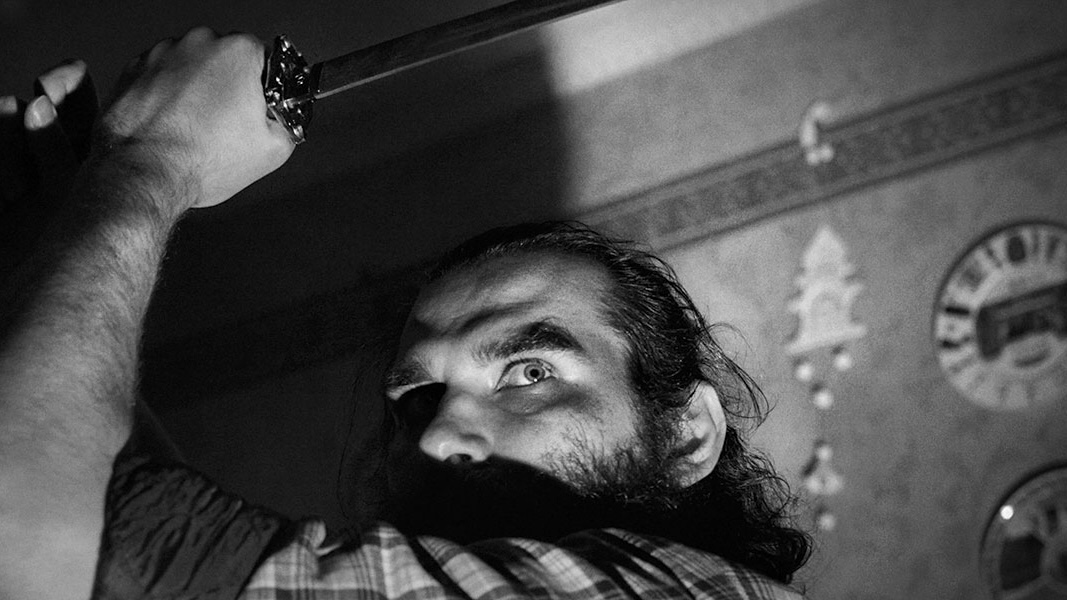 Back to selection
Back to selection
“With Viktor I Approached Sign Language Just Like Any Other Language”: Olivier Sarbil on His TIFF-premiering doc Viktor
 Viktor
Viktor One of the cinematic highlights of this year’s TIFF, Olivier Sarbil’s Ukraine-set (and Darren Aronofsky-produced) Viktor follows the titular protagonist, a Kharkiv resident who lives with his widowed mother and faces a most unusual conundrum. Desperate to defend his country, Viktor — a sword-loving giant of a man whose bible is Miyamoto Musashi’s The Strategy of the Samurai — is nevertheless blocked from joining the war effort because he just so happens to be Deaf.
Fortunately, Viktor possesses the dogged determination of a noble warrior and manages to convince the local army to take him on as a volunteer photojournalist since he also happens to be an artist behind the lens, stunning B&W images his specialty. It’s a talent he shares with the film’s director/DP, a veteran conflict photojournalist who likewise has a knack for coloring in B&W; and like his riveting star has a hearing disability, having lost the use of his right ear while covering the civil war in Libya over a decade ago.
A few days prior to the doc’s September 8th debut in the Platform section Filmmaker reached out to the Corsica-born, NY-based director to learn all about the intricate crafting of this “audiovisual experience,” a process that included members of the Sound of Metal team along with “Ukrainian-speaking Ukrainians, Russian-speaking Ukrainians, as well as individuals who are Deaf, Hard of Hearing, and Hearing.”
Filmmaker: So how did you first meet Viktor? What convinced you that he could carry an entire film?
Sarbil: I first connected with Viktor on Facebook while I was still casting within the Deaf community. Even before knowing his full story I sensed there was something unique about him. When we finally met in person my instincts as a filmmaker immediately sensed he was the one. Viktor just has this incredible charisma and a natural presence on camera. It was one of those rare moments in documentary filmmaking when you meet someone and you just feel the magic.
Filmmaker: How involved was Viktor in the actual production?
Sarbil: We involved Viktor in the production by asking him to document his thoughts and feelings in a journal for the voiceover piece. Through this approach we created a space for authentic self-reflection, capturing his inner world more intimately than would a traditional interview. It really allowed Viktor to shape the narrative, which enriched his role in the project.
I’ll add that without trust there is no film, so communication was essential throughout the nearly two-year filmmaking process. I stayed connected with Viktor, keeping him informed and addressing his concerns. This consistent partnership empowered Viktor to share his story with the authenticity and care it deserves.
Filmmaker: Could you talk a bit about the sound design and score? What was it like working with Nicolas Becker and Keikki Kossi (the Sound of Metal team) and Peter Albrechtsen?
Sarbil: Sound plays a vital role in the film. It has been an immense privilege to work with some of the best sound designers in the industry who have extensive experience with the Deaf community. Our collaboration began early in the filmmaking process and continued right through to the final mix.
To craft the sound of the Deaf world we aimed for a very organic approach to sound — one that immerses the audience in Viktor’s inner life and helps them understand what is happening inside his body. For example, the team re-recorded some of the original sounds through a hearing aid and used stethoscope microphones to capture sounds through the human body. This approach really allows viewers to experience the story and the sound from within Viktor’s perspective.
Filmmaker: I read that you learned Russian Sign Language and used translation apps to communicate with Viktor, and that the team included “Ukrainian-speaking Ukrainians, Russian-speaking Ukrainians, as well as individuals who are Deaf, Hard of Hearing, and Hearing.” So how did this multilingual aspect impact the shoot? Did it deepen the process? Slow things down?
Sarbil: I’m used to working in foreign countries, where different languages can sometimes slow things down, but I’ve found that this slower pace does often lead to deeper connections.
With Viktor I approached sign language just like any other language. By embracing new ways to communicate with your contributors I believe you can build strong connections that reflect a greater sense of authenticity in their stories.
Filmmaker: I’m also wondering how your injury in Libya in 2011 changed you as a person and as an artist. Did you ever consider retiring from conflict journalism after the incident?
Sarbil: I believe my wounds only deepened my determination to tell stories that reveal the complexities of the human condition. Something inside me died the day of the incident and I knew I would never be the same, but I refused to let that take away from my work as a filmmaker.
In recent years I’ve returned only because the projects were ambitious and I had the right tools to support me. I want to believe that this is my last experience with war. I now carry the physical and mental scars of decades of conflict. I will not go to war again… unless war comes to me.
